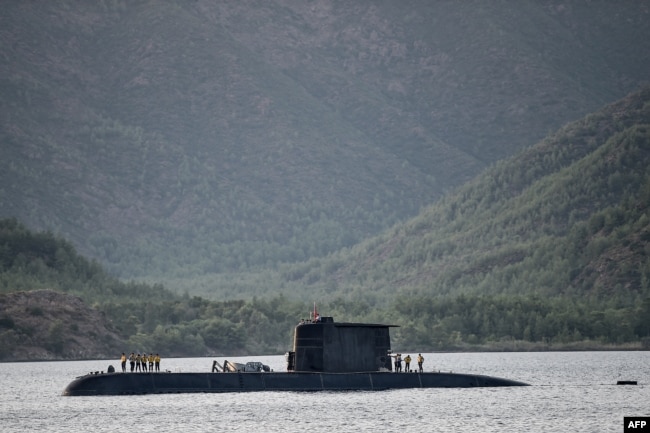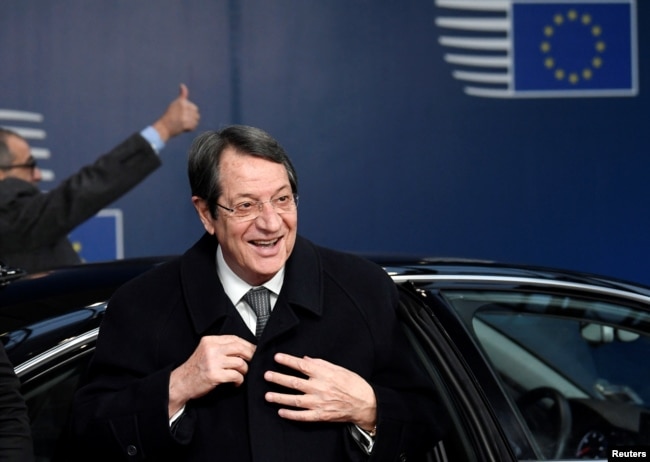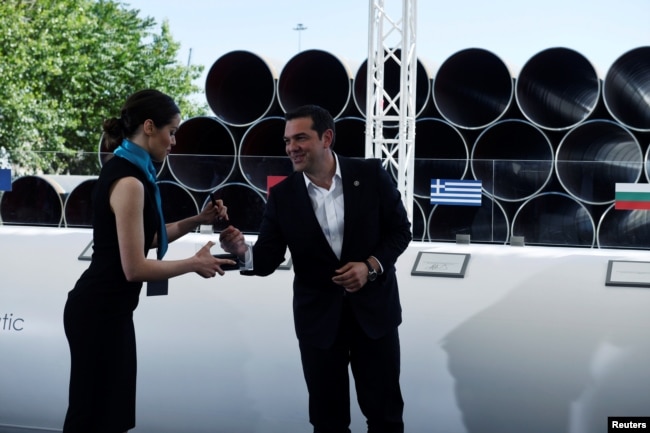Tensions between Greece and Turkey over the divided island of Cyprus are rising. Turkish President Recep Tayyip Erdogan is accusing the Greek Cypriots of pursuing “aggressive” policies, while local media report Ankara is planning to build a naval base on the Turkish side of the Mediterranean island, VOA news reports.
On Monday, Turkish newspapers allied with Erdogan reported a naval base could be constructed by 2019 on the Turkish Cypriot side of the island. “It (the report on the naval base) should be taken seriously,” said international relations professor Serhat Guvenc of Istanbul’s Kadir Has University.
“It has very many vocal advocates in the Turkish public among opinion makers. It has not become the official policy yet; however, the possibility of a base is stronger than for more than 10 or 20 years.”
Ankara has so far not denied reports of plans to build the installation. In the last few years, the Turkish military has embarked on a new policy of building permanent overseas bases, including in Somalia and Qatar. Unconfirmed reports say a Turkish naval base is also under construction on a Sudanese island in the Red Sea.
Building a naval establishment on the contested Cyprus Island, analysts say, would be a controversial step.
Cyprus has been divided since a Turkish invasion following a Greek-inspired coup in 1974. Only the Greek Cypriot administration is internationally recognized.
In the last few months, the Turkish navy has stepped up its presence around Cyprus in response to Nicosia pursuing energy exploration in Cypriot waters.
“As the Greek Cypriot side ignores the rights of the Turkish Cypriots and continues its aggressive policy, so we will continue to take the necessary measures,” Erdogan said Sunday at a press conference at the G-20 summit in Buenos Aires.
Ankara is demanding Nicosia collaborate with the Turkish Cypriot administration in the exploration for oil and gas reserves — a demand Greek Cypriots reject, saying they are the sole legitimate representatives of the island.
“Turkey should be taken seriously in the eastern Mediterranean,” said Guvenc. “The Turkish pattern of behavior around the energy issue has been very consistent. Turkey has not refrained on relying on its naval muscle to show its intentions on the division of resources around the island.”
The latest display of military might is widely seen as an empty threat. “The Turkish-Greek conflicts are like American wrestling — it’s not real,” said analyst Atilla Yesilada of Global Source Partners.
“You see people pounding each other kicking, slamming one another in the ring, but it’s all prearranged,” Yesilada added. “Nothing serious has happened since 1974. So, I am fairly sure of a lot of posturing and jingoism, but not one shot will be fired.”
Nicosia has strongly condemned Ankara’s increasingly muscular approach as “blackmail,” and called for support from its European Union partners. Paris has reportedly agreed to deploy warships to the Cypriot port of Larnaca. The French oil giant Total is one of the international companies that bought a drilling license for Cypriot waters.
Erdogan is standing firm. “Turkey does not intend to reduce its military contingent in Northern Cyprus,” he said in October. “The EU has also attempted to apply double standards in relation to the Turkish Cypriots.”
Nicosia seeks to broaden its support by courting international partners to develop its energy reserves. Last month, the Greek Cypriots signed a deal with Israel and Greece to build a pipeline to Europe to distribute recently discovered Israeli and Greek Cypriot natural gas.
“I attach particular importance to the interest shown by the U.S. in participating in the tripartite Greece-Cyprus-Israel (pipeline), which I expect will soon be confirmed in practice,” Cypriot President Nicos Anastasiades said on Tuesday in an address to the 6th Cyprus Energy Symposium in Nicosia.
The pipeline deal thwarted a Turkish initiative to distribute Israeli gas to Europe. Ankara is seeking to make Turkey a regional energy hub.
Some analysts suggest Ankara’s increasingly muscular approach toward Cyprus over energy rights should be viewed through the prism of domestic politics.
“There are talks now. Is Erdogan leading the military, or is the military leading Erdogan when it comes to this muscular approach in Cyprus,” said former senior Turkish diplomat Aydin Selcen. “This muscular approach could also be due to domestic politics, because we are going toward local elections.”
Selcen points out that with Erdogan’s ruling AK party struggling in opinion polls, he is out courting nationalist voters ahead of elections in March for control of Turkey’s main cities. A tough stance on Cyprus plays well with nationalists.
Ankara’s stance could also be a reaction to the fading hopes of a solution to the divided island.
“They (Ankara) have not given up on the prospect for a solution to the problem,” Guvenc said. “But I guess deep down, they know that the negotiations will not likely lead to a meaningful solution.”
“Ankara’s assumption was a reunified or reconfigured island. The two communities will agree on the distribution of the (energy) resources if there is a risk of a permanent partition of the island,” Guvenc said. “Turkey will probably up its claims on Cyprus and other parts of the eastern Mediterranean. And to show its seriousness, it may take more and more demonstrations of naval power.”




